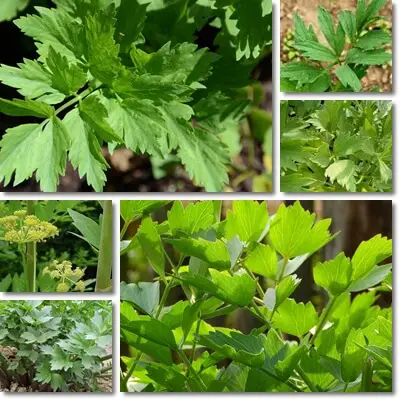Lovage (Levisticum officinale) is an aromatic seasoning plant found throughout Europe and southwest Asia. Lovage leaves, stems, seeds and root are all edible and aromatic essential oils can be obtained from the roots, seeds and leaves. The plant is an excellent source of antioxidants and its leaves and stems in particular are rich in nutritious elements like vitamin K, calcium and vitamin C. Eating lovage is reportedly good for digestive health, relieving bloating and indigestion and calming heartburn and as a tonic to strengthen the body.
What is lovage?
Lovage is a culinary herb used for seasoning or garnishing dishes and a culinary vegetable. It comes from the same family as carrots, celery, anise and parsley with which it shares certain traits. Actually, its distinct flavor profile in particular is reminiscent of other members of the Apiaceae (or Umbelliferae) family. The entire plant is edible and each part has a varying flavor intensity which dictates its use. The leaves are great in bean soup, lentil, peas and cucumber dishes, the seeds for pickles and biscuits while the root is eaten as a vegetable or used to make tea.

What does lovage look like?
Lovage looks like a larger parsley variety with more pointed leaves. The herb is a perennial plant, meaning it is long-lived so it doesn’t need to be planted every year. It usually grows to about 1.5 meters. The leaves and stems are dark green-colored with yellow-green hues, crisp and juicy. The leaves at the base are generally larger than those higher up the plant. Lovage has compound leaves made of three leaflets, or smaller leaves. Each leaflet is somewhat rhombus-shaped and visibly pointed with toothed margins.
Lovage produces yellow-green, small flowers grouped in umbels, a formation resembling an umbrella. The seeds have a golden-brown color and small ridges along them. Lovage root looks like a carrot, brown-colored with grayish tones and white on the inside.
What does lovage taste and smell like?
Lovage tastes a bit like celery, a bit like parsley and a bit like anise combined and has an overall strong flavor with overpowering green herbal notes and just a slight earthy-pungent aftertaste. You can smell lovage quite clearly when you are near it and that is because it contains powerful aromatic oils that give it its unique taste and smell. The older the leaves, the stronger their flavor. Lovage seeds taste like anise and are highly aromatic as a result of their rich essential oil profile (gallic acid, ellagic acid, myricetin, quercetin, salicylic acid, chlorogenic acid, angelic acid etc.).

What are the health benefits of lovage?
Lovage is an interesting herb and is good for the digestive tract and respiratory system in particular. Because it’s nutritionally dense and can be eaten fresh to preserve all of its nutrients, the herb can contribute to better immunity as well as energize and strengthen the body. Discover what are 8 excellent properties and uses of lovage leaves and seeds:
Relieves stomach gas and bloating
Eating fresh lovage is good for the stomach because it helps relieve gas and reduce bloating naturally. The seeds possess anti-bloating benefits as well, but should be consumed in small amounts. Tea can be made from lovage root and has carminative benefits as well.
Calms stomach upset and is helpful for indigestion
The carminative and antispasmodic properties of lovage contribute to its benefits on indigestion, helping calm stomach upset and offering relief for pain. What lovage does is help eliminate stomach gas which could cause painful cramps and discomfort. It also exerts a mild antispasmodic action, further contributing to relief. Lovage root tea is said to improve digestion as well as help with colic.
Natural expectorant and aquaretic
Lovage has been traditionally used to help eliminate phlegm in cases of respiratory infections. For this purpose, tea would be made from the dried leaves or root. Most important, lovage is an excellent natural aquaretic, a sort of diuretic that promotes the elimination of water without the loss of electrolytes like potassium or sodium. This property makes lovage good for water retention and conditions deriving from it (like swollen legs or ankles, bloating, face puffiness).
Nettle leaves also have aquaretic properties.
Reduces inflammation and relieves pain
Lovage has mild pain-relieving properties and can help relieve joint pain, abdominal cramps, possibly headaches and other types of pain. Studies show angelic acid is responsible for the mild analgesic properties of lovage, but other volatile oils in its composition and even nutrients (like magnesium with its antispasmodic effects) contribute to its pain-relieving benefits.
Strong antioxidant activity and anticancer effects
Research shows lovage has a high antioxidant content and the leaves are especially rich in flavonoids and other phenolic compounds with antioxidant activity. The antioxidants in lovage have been shown to be highly bioactive and actively scavenge for free radicals, protecting cells against damage. Volatile oils in the herb also have potent antioxidant properties and even show anticancer activity in vitro, inhibiting the proliferation of head and neck squamous carcinoma cells.
Rich in vitamin K
Lovage leaves are richest in vitamin K, promoting blood coagulation and preventing easy bruising, nosebleeds and bleeding in general. Vitamin K also has anti-inflammatory properties.
Important source of calcium, magnesium and potassium
Lovage leaves contain important amounts of calcium, magnesium and potassium. Calcium and magnesium help form strong bones, magnesium promotes muscle health, maintains good blood pressure and prevents arrhythmia together with potassium.
Natural tonic properties
Overall, lovage has a generous nutritional profile and its content of vitamins K, C and A, calcium, potassium, magnesium etc. gives it tonic, energizing properties. Eating lovage can contribute to skin health, strengthen the body and boost immunity.
Lovage side effects
The volatile oils in lovage and its oil can cause contact dermatitis and even photosensitivity. Having diuretic effects, lovage extracts, root or leaf oil and other preparations are not recommended for people with kidney problems or people with high blood pressure who are on diuretics. Eating too much lovage can interact with diuretic medication and anticoagulants and is reportedly unsafe during pregnancy in large amounts.
